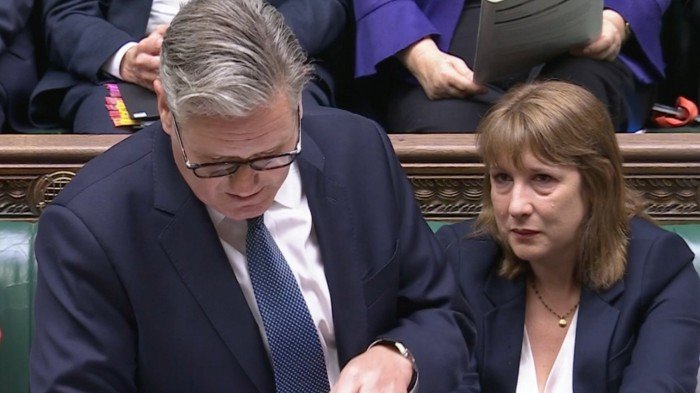Unlock the Editor’s Digest for free
Roula Khalaf, Editor of the FT, selects her favourite stories in this weekly newsletter.
Sir Keir Starmer has said Rachel Reeves will be chancellor for “a very long time to come” as the prime minister moved to stem speculation over her future.
UK government bonds and the pound fell sharply on Wednesday afternoon after Starmer declined to back a tearful Reeves in the House of Commons following Labour’s dramatic gutting of its welfare bill.
Starmer initially refused to say that the chancellor would remain in her post in a combative exchange on Wednesday with Conservative leader Kemi Badenoch after the government ditched a planned £5bn of disability benefits cuts.
Gilts slumped as investors grew nervous, pushing the 10-year yield up 0.16 percentage points to 4.61 per cent, the biggest one-day rise since the global bond market rout in April and, at one point, the sharpest sell-off since then Conservative prime minister Liz Truss’s ill-fated 2022 “mini” Budget.
The pound dropped 0.9 per cent against the dollar and 0.7 per cent against the euro.
But on Wednesday evening Starmer moved to bolster his chancellor, telling the BBC the reason she was upset was “nothing to do with politics”.
“She’s made it clear that it’s a personal matter,” Starmer said, saying he would not discuss a colleague’s personal business. “She’s done an excellent job as chancellor . . . We work together, we think together . . . we’re in lockstep.”
Starmer added the reason Reeves was seen wiping away tears in the chamber on Wednesday was “nothing to do with what’s happened this week. She will be chancellor for a very long time to come”.
Mike Riddell, a fund manager at Fidelity International, said investors were fearful that, if the chancellor were replaced, there was a greater risk that the government’s fiscal rules would be “changed or ditched, [implying] even bigger deficits and issuance”.
One Reeves ally said the market reaction to the chancellor’s tears — fuelling speculation she might quit — was a “clear indication” that gilt investors saw her as a bulwark against excessive government borrowing.
“Being chancellor is a tough job,” said the ally. “But we are going to be the ones that are honest about trade-offs and choices.” Reeves’ team insist she has no intention of quitting.
Her allies are already warning the welfare retreat means she cannot afford to axe the two-child benefit cap widely despised by many MPs. Starmer said last month he would “look at” scrapping the cap, at a cost of £3.5bn.
Reeves, who sat beside Starmer during Prime Minister’s Questions on Wednesday and had entered the chamber looking upset, appeared to shed a tear after the prime minister did not give her his full backing when asked about her future by Badenoch.
One Tory MP said it was “one of the most expensive tears in history”. The prime minister’s press secretary later said Reeves had Starmer’s “full backing” and was “going nowhere”.
In the Commons, Starmer said he was “thankful” for the chancellor but the absence of full-throated support increased speculation that her position was under threat.
Reeves has become a target for rebel anger over Labour’s handling of the welfare reforms. Badenoch said the chancellor was being used by Starmer as “a human shield for his incompetence”.
As PMQs ended, Reeves was ushered out of the chamber by her sister and fellow MP, Ellie Reeves, who is chair of the Labour party. She appeared to squeeze the chancellor’s hand as she guided her from the chamber.
Starmer’s press secretary said the prime minister has previously said Reeves would serve as chancellor for the whole parliament. “He doesn’t have to repeat [that] every time.”
Asked whether Reeves had offered her resignation, the press secretary said: “No.” She said Reeves and Starmer were getting on with delivering reforms.
A spokesperson for Reeves said of her distraught appearance: “It’s a personal matter, which — as you would expect — we are not going to get into. The chancellor will be working out of Downing Street this afternoon.”
Both Downing Street and Reeves’ team categorically denied there had been any row between the prime minister and chancellor.
A tipping point, according to several Labour MPs, came when an exhausted-looking Reeves was seen having an exchange with House of Commons Speaker Sir Lindsay Hoyle minutes before PMQs.
Hoyle had the previous day cut Reeves short during Treasury questions, prompting the chancellor to roll her eyes and say: “Urgh, all right, OK, fine.”
One person briefed on the incident said Hoyle told Reeves that her behaviour had “not been a good look”, while she insisted she had “not done anything wrong” but was under pressure. Reeves’ allies confirmed there had been an exchange. The Speaker’s office declined to comment.
Reeves’ position is of huge interest to investors as she has pledged to abide by strict fiscal rules. But she is operating with minimal fiscal headroom and the government’s U-turn on welfare has created a £5bn hole in her plans to boost the public finances.
There is growing speculation Reeves will need to increase taxes at the autumn Budget or pare back Labour’s spending plans — something that has become more challenging with backbench MPs increasingly aware of their influence over the government’s agenda.



